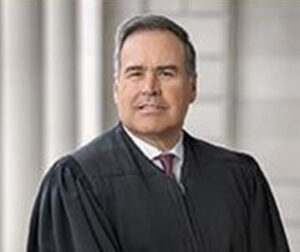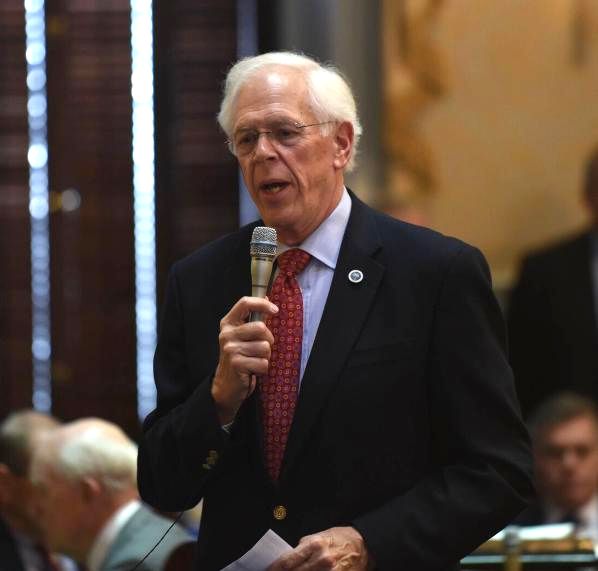Dear Friends:
Our Founding Fathers created the Constitution to limit the Federal government. They quickly amended it with the Bill of Rights to enshrine every citizen’s God-given rights. The Second Amendment is clear: “The right of the people to keep and bear Arms, shall not be infringed.”
Gun-grabbers continue to quibble over the meaning of the first sentence in 2A, “A well-regulated Militia.” But the Founders’ intent was clear. In drafting the Virginia Constitution, Thomas Jefferson wrote: “No freeman shall ever be debarred the use of arms.” This week, South Carolina followed Jefferson’s directions.
The 2A news is featured in my LEGISLATIVE SPOTLIGHT. But first, here are several top legislative news items.
School Choice Advances
 SC is continuing the road toward educational freedom. A bill (H.5164) that would expand the popular Education Scholarship Account (ESA) program enacted last year was approved by the House Education Committee on a 12-4 vote along party lines and sent to the full House.
SC is continuing the road toward educational freedom. A bill (H.5164) that would expand the popular Education Scholarship Account (ESA) program enacted last year was approved by the House Education Committee on a 12-4 vote along party lines and sent to the full House.
The current-year-old choice program calls for 15,000 children from households making less than 400 percent of the federal poverty line to receive $6,000 taxpayer-funded scholarships to attend private schools by the 2026-27 school year. So far, 5,015 students have applied in the program’s first year. Forty-seven percent are black, 31 percent are white, and the remainder are Hispanic or mixed race.
Expanding this program, we’re making strides toward a future where every parent can choose the best educational path for their children, further enriching our state’s diverse educational ecosystem. This bill passed favorably out of committee, and I expect it to be on the House floor in the coming weeks.
Meanwhile, the state Supreme Court heard arguments this week on whether the current initial ESA program violates the state constitution’s prohibition against public funds going to private schools.
Derailing DEI
Diversity, equity, and inclusion (DEI) aims to promote the fair treatment and full participation of all people, particularly those who claim to suffer from discrimination. A significant thrust of DEI is diversity training. It’s the “in thing” in WOKE corporations and universities.
Florida recently applied the brakes to DEI, forcing the University of Florida to fire its entire DEI staff. Another report claims the University of Virginia has at least 235 employees under the DEI banner at a cost estimated at $20 million annually.
SC universities are also involved in the DEI business. Recently, a House Education panel has been meeting and hearing testimony from those who support and oppose DEI at our public colleges and universities. Thursday, the panel voted for approval of an amendment to H.4289. That legislation would ban the use of DEI in student admissions or in hiring or promoting faculty members or employees. It also bans higher education from requiring a commitment to any political ideology or movement, such as DEI.
The legislation is a first step and moves forward to the full Education Committee.
Protecting Farmers
The FARMERS PROTECTION ACT is moving swiftly through the House (H.5169). The bill was introduced last week with 47 sponsors. It protects SC farmers from being victimized by WOKE initiatives that could shut them down. The legislation would prohibit financial institutions from restricting services to farmers based on ESG-type environmental policies. It also empowers the agriculture commissioner to investigate and the attorney general to prosecute violators. I testified in support of the bill at the sub-committee on Tuesday. Thursday, the full House Agriculture Committee approved sending the bill to the full House for debate and a vote.
week with 47 sponsors. It protects SC farmers from being victimized by WOKE initiatives that could shut them down. The legislation would prohibit financial institutions from restricting services to farmers based on ESG-type environmental policies. It also empowers the agriculture commissioner to investigate and the attorney general to prosecute violators. I testified in support of the bill at the sub-committee on Tuesday. Thursday, the full House Agriculture Committee approved sending the bill to the full House for debate and a vote.
New Supreme Court Chief Justice
 This week, the General Assembly elected John Kittredge Chief Justice of the SC Supreme Court. He will succeed former Chief Justice Don Beatty, who has served in the position since 2017 and will retire this summer as he hits the state’s mandatory judicial retirement age of 72. Kittredge was first elected to the high court in 2008. He has served on the bench since 1991, starting as a family court judge, then a circuit court judge and judge on the Court of Appeals before he was elected to the Supreme Court.
This week, the General Assembly elected John Kittredge Chief Justice of the SC Supreme Court. He will succeed former Chief Justice Don Beatty, who has served in the position since 2017 and will retire this summer as he hits the state’s mandatory judicial retirement age of 72. Kittredge was first elected to the high court in 2008. He has served on the bench since 1991, starting as a family court judge, then a circuit court judge and judge on the Court of Appeals before he was elected to the Supreme Court.
Considered an originalist, Kittredge is viewed as a conservative on the court. He pushed back against that moniker during a hearing before the state’s judicial vetting panel, saying, “I am not political in any sense. Judges adjudicate. Judges do not legislate.”
Justice Kittredge will serve South Carolina well.

Constitutional Carry is SC Law
Legislation allowing South Carolinians to openly carry handguns without a permit was signed into law. It took effect just minutes after the bill (H.3594) was ratified by the House and Senate and delivered to Gov. Henry McMaster. SC joins a majority of states by being the 29th state to provide for permitless open carry of a weapon. This is an expansion of our state’s gun rights. For the past three years, SC has allowed the open carry of handguns for those with a concealed weapons permit (CWP).
effect just minutes after the bill (H.3594) was ratified by the House and Senate and delivered to Gov. Henry McMaster. SC joins a majority of states by being the 29th state to provide for permitless open carry of a weapon. This is an expansion of our state’s gun rights. For the past three years, SC has allowed the open carry of handguns for those with a concealed weapons permit (CWP).
“This bill expands the Second Amendment rights of our law-abiding citizens and will keep violent criminals behind bars with increased penalties for illegal gun use and possession.” – Gov. Henry McMaster
The new law allows adults eligible to possess a firearm to carry their weapon without first obtaining a CWP. Previously, those who wished to carry had to take a CWP class and demonstrate their proficiency on a firing range to receive a permit.
The state’s CWP program won’t cease to exist. Only those with a CWP can enjoy reciprocity, with 32 states recognizing SC’s CWP. Additionally, under the new statute, CWP holders will face lighter sentences if they are convicted of a crime using a gun. These benefits serve as incentives to receive gun training, which is highly encouraged.
Tough on Felons: The bill provides prison time for anyone found possessing a firearm who was not legally allowed to have a gun. Violations would be a felony with a maximum penalty of five years imprisonment, mandatory minimum sentences of five years in prison for a second offense, and ten years for a third offense.
Safety Concerns Addressed: Some claim this law is going to turn SC into the ‘Wild West’ with gun-toting bad guys shooting up bars at 2:00 a.m. They said the same thing in 2014 when SC passed the restaurant-carry provision that allowed CWP holders to be armed in restaurants that served alcohol if they didn’t consume alcohol. There have been no reported incidents.
Ohio’s New Evidence: Ohio’s Constitutional Carry law was enacted in June 2022. A study commissioned by the Ohio Attorney General’s Office identified a significant decline in Ohio’s gun crime since that time. The Attorney General emphasized, “The key takeaway here is that we need to focus on criminals, not responsible gun owners.”
Reality Check: Don’t look for good guys to strap on guns for everyone to see; they know that weapon concealment is the best personal protection. Ask any of the 526,000 South Carolinians with a Concealed Weapons Permit (CWP) if they plan to open carry.
The New Rules: Anyone 18 or older — regardless of whether they have a concealed weapons permit — can legally carry a firearm on their person in public. Weapons would no longer need to be secured while in a vehicle, and simply carrying a gun openly in public would not be a sufficient prerogative for a police officer to suspect a citizen of wrongdoing. The law still includes limits on where people can carry weapons — sensitive areas like a courtroom during session, government buildings, schools, polling places on election days, or daycare centers — gun owners will legally be able to carry in other places where they are given express permission to do so, like private businesses or religious institutions, that they weren’t allowed previously.
SC Crime Factoids: The media would have you believe that crime is rampant. For perspective, here are the latest SLED crime statistics:
- Since 1993, SC’s violent crime rate has decreased by 51.7%
- SC’s murder rate decreased by 11.9% from 2021 to 2022.
- Sexual battery in SC is at its lowest rate in comparison to the last 30 years.
- SC’s robbery rate is the lowest in the last 30 years.
- SC’s property crime has decreased for the eleventh consecutive year.
LEGISLATIVE BRIEFS
 “Pork Chopper” – The House unanimously approved legislation (H.4612) dealing with the taking of feral hogs by helicopter. The Department of Natural Resources requires a permit to take feral hogs only on private land exceeding 500 acres. An estimated 138,000 Feral hogs in SC wreak havoc on farmland. This bill aims to protect land, water, wildlife, livestock, domesticated animals, human life, and crops and meet wildlife management objectives.
“Pork Chopper” – The House unanimously approved legislation (H.4612) dealing with the taking of feral hogs by helicopter. The Department of Natural Resources requires a permit to take feral hogs only on private land exceeding 500 acres. An estimated 138,000 Feral hogs in SC wreak havoc on farmland. This bill aims to protect land, water, wildlife, livestock, domesticated animals, human life, and crops and meet wildlife management objectives.
Dog Collars – A bill prohibiting illegally removing a dog’s collar passed the House unanimously and was sent to the Senate. This bill (H.4611) seeks to make it an offense for a person to intentionally remove or destroy an electronic collar or other electronic device placed on a dog by its owner. A person who violates this law is guilty of a misdemeanor and subject to penalties. Aiken County Rep. Bill Hixon sponsored the bill; I am a cosponsor.
Emergency Workers Safety – When this bill becomes law (and I pray it does), motorists will pay a hefty fine for endangering first responders on the highway. This bill (H.4436) requires the driver of a vehicle who approaches or passes an emergency scene or authorized emergency vehicle with emergency lights flashing to control their vehicle to avoid interfering with the operation of an authorized emergency vehicle. A person violating this requirement is guilty of a misdemeanor and, upon conviction, must be fined no less than $300 or more than $500.
Firefighter’s Cancer Benefits – The House unanimously approved H.4680, a bill that removes the residency requirement for firefighters under the Firefighter Cancer Health Care Benefit Plan.
Early Voting Hours Extended – Voting early can be confusing because the hours vary. The House approved legislation (H.4590) to extend the closing times for early voting centers. It still needs Senate approval. The bill would change closing hours for these centers from 6 p.m. to 7 p.m. on weekdays for statewide general elections. These hours would also increase from 5 p.m. to 7 p.m. on weekdays for early voting in other elections that are not statewide general or runoff.
Affordable Housing – A bill that Gov. McMaster said is a crucial strategic initiative to bolster and fortify our national security framework passed the House unanimously. H.4552 expands projects that can be undertaken to redevelop a Federal military installation in SC to include affordable housing projects. Our military personnel need affordable living places, and this bill makes housing financing easier.
Mobile Optometry Units – To help rural areas with health services, the House approved H.4333, which expands the availability of mobile optometry units operating only during the school year. This bill allows mobile optometry units to operate during the summer when schools are not in session to serve children from low-income communities.
Social Work Interstate Compact Act – Another step to improve health services, the House approved H.4365, allowing SC to enter into a multistate agreement to access social work services. The compact requires member states to recognize licenses for social workers issued by any other member state and allows for the practice of telehealth between member states.
Help with Transporting Medicaid Patients – The House approved and sent the Senate H.4113, a bill that creates an ambulance assessment fee for private ambulance services charged by the SC Department of Health and Human Services. The fee would be deposited in a newly established Ambulance Fee Trust Fund, where this funding can be augmented with federal matching dollars. The Trust Fund will be used exclusively to supplement Medicaid reimbursements for ambulance services to make the transportation of Medicaid patients more cost-effective. The bill has the support of ambulance companies.
Real Estate Licensing – Comprehensive revisions and updates to the provisions governing the licensing and regulation of real estate brokers, brokers‑in‑charge, associates, and property managers were approved by the House and sent to the Senate (H.4754).
IN THE SENATE
(Courtesy of Sen. Shane Massey)
Medicaid Fraud Investigations – The Senate passed The Senate passed (S.578) a bill that would allow state tax return information to be disclosed to the Attorney General or a federal grand jury to investigate Medicaid fraud.
Property Transfers on Death – The Senate passed S.755, allowing owners of personal property with titles (cars, boats, etc.) to have Transfer of Death designations noted on the title.
Disclosure of Blood Type on Driver’s Licenses – The Senate passed S.968, allowing license holders to disclose their blood type on their driver’s license. It would not be required; it would give the license holder the choice to make the disclosure.
Ignition Interlock Devices – The Senate passed H.3518 and returned it to the House to consider Senate amendments. The bill would allow a person to enroll in the Ignition Interlock Device Program if the person’s driver’s license has been suspended for an alcohol-related driving offense. The Interlock program allows a person to drive. Still, the person must install an ignition interlock device on the vehicle that will prevent the vehicle from starting if the driver’s alcohol concentration is above a certain threshold.
Locating Endangered People – The Senate passed legislation (S.235) that would allow wireless service providers to disclose cell phone location data to law enforcement if there is a risk of death or serious physical harm. The purpose of the bill is to help law enforcement locate kidnap victims.
Kidnapping – The Senate passed a bill (S.947) that would allow kidnappers to be sentenced to up to 30 years in addition to a murder conviction. Currently, the law does not allow for a kidnapping sentence if the perpetrator is also convicted of murder.
Child Luring – The Senate unanimously passed S.877, a bill that would create a new criminal offense of luring a child into a vehicle or structure without the consent of the child’s guardian.
Homicide by Child Abuse – The Senate passed S.839, which would expand the crime of homicide by child abuse from the current law requiring victims to be under the age of 11 to allow victims to be under the age of 18.
Looking Ahead
Next Week’s Budget Debate
 Next week promises to be pivotal in the House of Representatives. We are set to debate next year’s state budget (H.5100). This comprehensive budget not only reflects our state’s economic success but also reaffirms our dedication to prudent fiscal stewardship. This budget thoughtfully addresses essential areas such as education, healthcare, infrastructure, and economic development, ensuring that our growing needs are met while maintaining our commitment to efficiency and fiscal responsibility. It also looks to refund $500 million to homeowners. I invite you to preview the proposed House budget: VIEW HERE
Next week promises to be pivotal in the House of Representatives. We are set to debate next year’s state budget (H.5100). This comprehensive budget not only reflects our state’s economic success but also reaffirms our dedication to prudent fiscal stewardship. This budget thoughtfully addresses essential areas such as education, healthcare, infrastructure, and economic development, ensuring that our growing needs are met while maintaining our commitment to efficiency and fiscal responsibility. It also looks to refund $500 million to homeowners. I invite you to preview the proposed House budget: VIEW HERE
PICTURE OF THE WEEK
 Meet Levi Campos, a 9th grader at South Aiken Christian Baptist School. We met up this week as part of his school civics project. He needed a picture with me. In addition to having this picture made, he received an SC State Flag, the current legislative manual, and a hard-bound booklet containing the US Constitution and the Declaration of Independence. My book inscription to Levi was simple: “After the Bible, this is the most important book you’ll ever read.”
Meet Levi Campos, a 9th grader at South Aiken Christian Baptist School. We met up this week as part of his school civics project. He needed a picture with me. In addition to having this picture made, he received an SC State Flag, the current legislative manual, and a hard-bound booklet containing the US Constitution and the Declaration of Independence. My book inscription to Levi was simple: “After the Bible, this is the most important book you’ll ever read.”
Want to Know More?
Do you want to learn more about my positions, bill sponsorships, voting record, and past writings? Here are some handy links:
- About Me: https://taylorschouse.com/about-2/
- My Positions: https://taylorschouse.com/issues/
- Sponsored Bill & Voting Record: http://tiny.cc/b1pouz
- Recent Newsletters: https://taylorschouse.com/category/newsletter/
I’m Available & AT YOUR SERVICE

It is my honor to be of service. Please do not hesitate to contact me if you need assistance navigating state government or have any thoughts or concerns about the legislature.
In Your Service,

Email: Bill@taylorschouse.com
www.TaylorSCHouse.com
Newsletter not paid using taxpayer funds.
Legal Notice: This newsletter is not a solicitation for contributions to any SC registered lobbyist.

